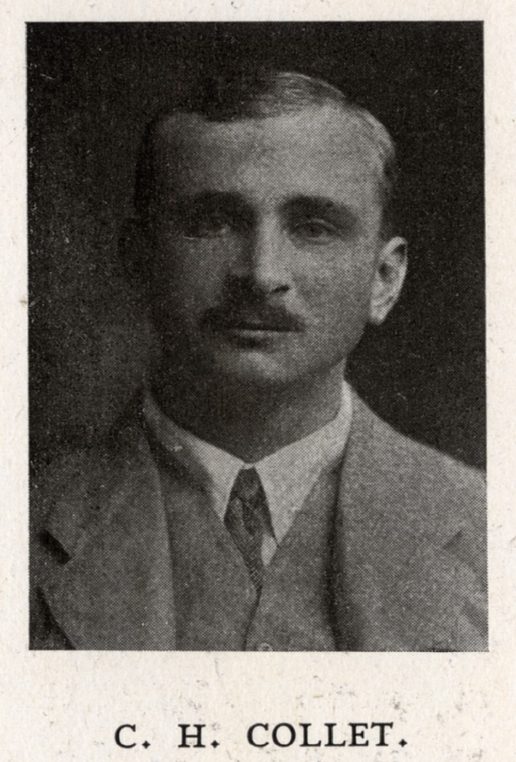Collet, CH
(1888 - 1915)

Key Facts
DATE OF BIRTH:
4th February 1888
YEARS ATTENDED THE COLLEGE:
1901 - 1905
HOME ADDRESS WHEN AT THE COLLEGE:
296 East Dulwich Rise, Lordship Lane
REGIMENT
Royal Marine Artillery (attached Royal Naval Air Service)
FINAL RANK:
Flight Commander
DATE OF DEATH:
19th August 1915
AGE AT DEATH:
27
WHERE HE DIED (or was wounded)
Gallipoli
LOCATION OF GRAVE OR MEMORIAL:
Lancashire Landing Cemetery. K 49
Flight Commander Charles Herbert Collet
Charles was born in what was then Calcutta, India, on 4th February 1888, the middle of three sons of James and Teresa Collet. All three boys attended Elizabeth College, Guernsey, before simultaneously starting at the College in September 1901. Charles progressed from Dulwich to the Royal Naval College at Greenwich, and from there passed out into the Royal Marine Artillery, being promoted to Lieutenant in July 1906. He was a noted sportsman in military circles, winning the Navy and Marine Lightweight Boxing Championship in 1907, and was a member of the H.M.S. Duncan shooting team who were victorious in the Pembroke Camp Challenge Cup in 1912. He really distinguished himself after this as an airman however, first rising to prominence when, in late 1913, he outflew a noted German pilot in the “big biplane” which the admiralty had bought from a works in Leipzig. Early the next year, having equipped this plane with an additional fuel tank, he took off from Plymouth to successfully complete a flight to John O’Groats, albeit with a short stoppage in Grimsby caused by an engine problem; it was at the time the longest flight yet completed in Britain. Later in the year he was also to become the first Officer of the Naval Air Service ever to complete a “loop the loop”.
Once war began his flying skills were to be heavily utilised, and on September 23rd 1914 Charles led what was arguably the world’s first long range aerial bombing raid, successfully launching an attack on the German Zeppelin sheds at Dusseldorf, a feat for which he was mentioned in dispatches, for the first of what would go on to be two occasions, and awarded the D.S.O. Subsequently, whilst engaged on the Western Front in late 1914 and early 1915, his plane was brought down twice, and on one of the occasions he was taken prisoner by a group of Belgian soldiers who mistook him for a German! In February 1915 he was promoted to Flight-Commander, and shortly afterwards went out to Turkey, where he was to be charged with supporting the Gallipoli landings; interestingly he felt that the Turkish airmen of this period put up a better fight than their German counterparts. On 19th August 1915 he was charged with taking an aircraft he had never flown before to another aerodrome; shortly after take-off the engine failed, causing the plane to crash and catch fire, with fatal results.